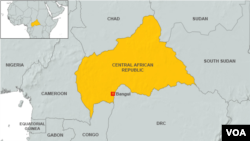The military commander of one of the groups that signed a disarmament pact in the Central African Republic this week says he has several reservations about the agreement.
Nine armed groups have signed the pact, which is aimed at disarming, demobilizing and reintegrating or repatriating fighters. Organizers are still waiting for a smaller group led by the veteran rebel Abdoulaye Miskine to sign.
In most cases, the movements' political leaders, not their military commanders, signed the agreement. That left one commander, the self-styled General Joseph Zoundeiko of the RPRC, with doubts.
Zoundeiko was reported as saying after the signing ceremony, “It’s good that the politicians have agreed to sign, but the realities on the ground are another thing.”
That wasn't his only objection.
"There are some things in the agreement we don’t like," Zoundeiko told reporters. “We’re supposed to assemble our men at certain sites, but if we assemble them, how will they eat, and how will they go and earn money? The agreement says recruitment [to the army] will be individual and progressive, but soldiers’ work is collective.”
However, the RPRC’s political leader, Herbert Gontran Djono Ahaba, nephew of former C.A.R. President Michel Djotodia, downplayed the criticism. He said the group would have to address the attitude of certain officers so that the peace process was not undermined.
C.A.R. has had peacemaking forums before, in 2003 and 2008. Some regional analysts have suggested this one seems less likely to lead to a power-sharing deal between armed group leaders in advance of elections, as happened after the previous two dialogues.
The biggest armed group, the anti-balaka, called at the latest forum for a government reshuffle, but most of the participants, who came from political parties and civil society, rejected that proposal.
The Republican Pact agreed upon at the forum calls for a new constitution and for the establishment of a court to try those accused of war crimes. The pact does not seem to offer major concessions to the armed group leaders’ ambitions.
The agreement commits the government and international partners to feed and look after the demobilized combatants until they are either recruited by the army or helped to rejoin civilian life. A diplomat told VOA that money still needed to be raised for much of this process.
C.A.R. descended into violence in 2013 after mostly Muslim rebels ousted the president, which then was followed by revenge attacks by Christians on Muslims. An international peacekeeping force has restored a tenuous calm.




